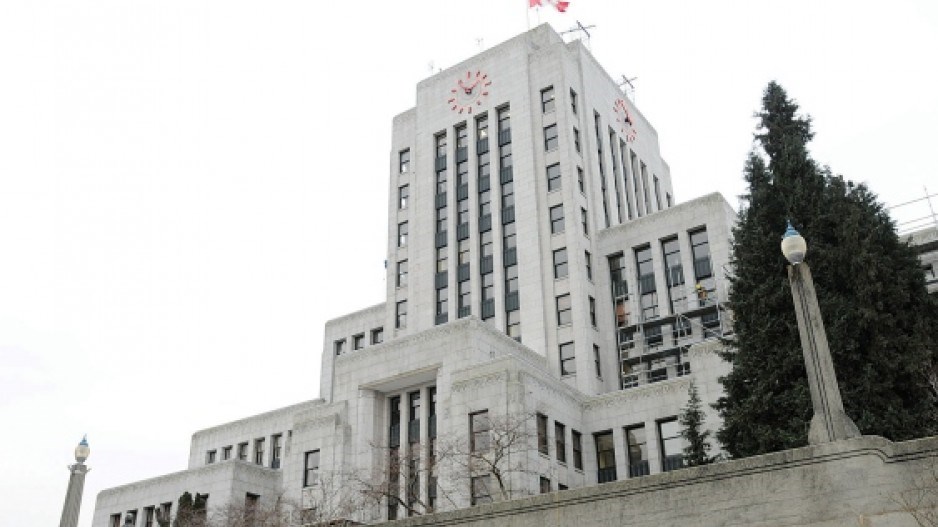The City of Vancouver has had a new mayor for just over a year.
When Research Co. and Glacier Media asked Vancouverites about the current state of affairs, just over half (51 per cent) approve of the way Ken Sim is managing his duties, while 29 per cent disapprove and 21 per cent are undecided.
Coming off a municipal election where turnout was tabled at a dismal 36 per cent, there are many residents of the city who may be active in discussing the issues that affect our lives but chose not to cast a ballot in October 2022. Non-voters are especially oblivious to the actions of the mayor, with 44 per cent of them saying they cannot rate his performance at this point.
Sim’s approval rating sits at 73 per cent among Vancouverites who supported him last year and at 49 per cent among those who voted for then-incumbent mayor Kennedy Stewart. Satisfaction with Sim’s actions is lower – 34 per cent among those who cast ballots for other mayoral candidates, one of whom is banned from participating in local elections for failing to observe campaign finance rules.
When residents of Vancouver ponder the most important issue facing the city, almost half (48 per cent) mention housing. While this is a matter where we can point to specific generational differences at provincial and federal levels, Vancouver is different. Sizable proportions of residents aged 18 to 34 (45 per cent), aged 35 to 54 (44 per cent) and aged 55 and over (46 per cent) all look at housing as the most pressing concern.
Drug overdoses are a distant second on the list of important issues facing Vancouver (12 per cent), followed by crime (nine per cent), property taxes (also nine per cent), poverty (eight per cent), jobs (five per cent), climate change (four per cent), transit (two per cent) and congestion (one per cent).
Aside from the impressive dominance of housing, there are some neighbourhood nuances on the other issues. Practically one in four residents of the downtown area (23 per cent) say drug overdoses are their main priority. Crime climbs to 15 per cent among residents of the West Side, while poverty reaches 10 per cent on the East Side.
Now that A Better City (ABC) has held majorities in council, the school board and the park board for a year, we asked Vancouverites if they perceive momentum on 11 matters pertaining to the municipal administration. The proportion of residents who are ready to say that things are better now than a year ago fluctuates from seven per cent (public schools) to 15 per cent (jobs and economic development). This leaves a significant proportion of residents who feel there has been no change or that specific issues have deteriorated.
There are four matters where Vancouverites do not perceive a decline. Majorities of residents say the situation is about the same as in 2022 on public schools (54 per cent), public recreation and activities (57 per cent) and parks and facilities (58 per cent), and more than two in five feel the same way about fiscal responsibility (44 per cent). There has been a change in the way City Hall is discussing some marquee undertakings, particularly those related to sporting events, so it is not a surprise to see these files doing better than others.
Other topics find more skepticism from Vancouverites. About a third (32 per cent) say the situation is worse now than a year ago on three issues: The influence of developers, the cleanliness of streets and road maintenance, and jobs and economic development. Recent pronouncements on specific endeavours, particularly the highly publicized Little Mountain project, may be making it difficult for ABC to distance itself from past and present connections with developers.
More than two in five Vancouverites believe four other issues are worse now than they were before Sim took office: Public safety (44 per cent), policies to deal with homelessness (46 per cent), quality of life (also 46 per cent) and housing affordability (60 per cent). Majorities of residents of all genders, ages and regions believe housing affordability has worsened over the past year.
It is fair to say that a year is too little to solve all of the problems facing Vancouver. The public seems to be reacting positively to some aspects of life in the city, but our survey found that 42 per cent of Vancouverites who voted for Sim in 2022 believe their quality of life has worsened over the past 12 months. The current mayor and council may be succeeding on some cosmetic aspects, but there is a long road ahead to make residents feel better about their place in the city. If these indicators remain stagnant, the 64 per cent of eligible voters who chose not to participate in the last democratic process may be more motivated to do so in the next one.
Mario Canseco is president of Research Co.
Results are based on an online study conducted from Nov. 4-6, 2023, among 400 adults in the City of Vancouver. The data has been statistically weighted according to Canadian census figures for age, gender and region in the City of Vancouver. The margin of error is plus or minus 4.9 percentage points, 19 times out of 20.





